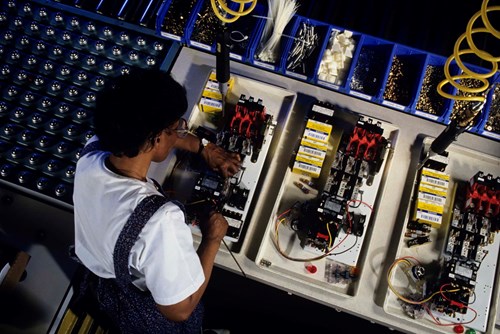Women in manufacturing - the secret to her success?
8 March 2017
To celebrate International Women’s Day, the Business Growth Hub has produced a series of blogs to look closely at the role of women within different business sectors. Here, Anne Campion, Manufacturing Lead, explores what can be done to encourage more women to consider a career in the manufacturing sector.
“Because you've got guy parts, you're automatically a better engineer than me?”
If you’re aghast at the paraphrased words of author Rachel Caine in this 21st century, you shouldn’t be. Yes, our attitudes to gender equality have come a long way, but in certain industries the myth of what it is to be a woman quietly exists.
Across Greater Manchester, the manufacturing sector employs 118,000 people and is one of the most productive sectors with Gross Value Added (GVA) forecast to grow 30% by 2023, but that’s not to say it’s free of challenges.
The Greater Manchester Manufacturing Strategy identified that a skills shortage is a major factor impacting the growth potential of the sector. Simultaneously, the EEF has reported that women represent just 15% of the average factory’s workforce. This gap presents an opportunity for the sector.
“Women are a key source of untapped potential which we need to harness to boost economic growth in the UK,” states Cilla Snowball CBE, Chair of the Women’s Business Council (WBC).
The WBC found that the engineering and technology sectors offer graduates the highest earning potential – £769 per week on average. However, only 14% of female graduates choose to enter the sector - with health, education and public administration attracting more women. The WBC attributes 22% of the gender pay gap to the industries and occupations that women choose to work in.
Bridging the gap

So why aren’t more women joining the sector?
Leanne Holmes is Site Managing Director and Operations Director at Cranes Payment Innovations in Oldham. She has worked in manufacturing since graduating from university and is a passionate advocate for women entering the sector.
“I was always strong academically, particularly in maths and sciences. I really enjoyed problem-solving, however, the careers advice that I received at school steered me into a more traditional science-based career path – either medicine or teaching.”
“My entry to the sector came completely by chance, with a six-week placement in a Bury-based paper factory as the Managing Director’s PA. It was during this time that I was offered a role in the materials team and I realised that the sector could offer a really interesting career for me.”
This story is similar for Gemma Stuart, who is a Production Operative at Focused Nutrition - a food and drink manufacturer based in Stockport.
Gemma is in her final year of a Level 2 Food Industry Skills apprenticeship, which she has undertaken via The Skills Company, however, her interest in the sector came to her by chance as well.
“At school, I was much more interested in music, drama and art, but for my work experience I went to a reprographics firm and I really enjoyed it,” she explains.
“After I left college I applied for a role in a print finishing company which I saw advertised in the newspaper. I got the role and found it was a completely different experience to my reprographics role. I was on the shop floor doing a manual job which I really enjoyed.”
Gemma’s move into the sector was a surprise to some of her family and friends.
“I suppose my career is different to most of my friends. They are mostly office based, but I just can’t imagine having a desk job, I like getting my hands dirty and having a demanding, physical job. I think my Dad being a self-employed mechanic opened my eyes to the different types of career that are out there.”
Gemma has worked in two factories in the North West but has never had a female work colleague.
“At the moment I work with seven men and there aren’t even any separate ladies toilets. It’s a friendly environment, but I can imagine that for some women it might seem quite intimidating.”
Leanne agrees that environmental changes could make the sector more appealing to women.
“The sector has so much to offer – you can be creative, solve problems, manage people or projects, work in marketing, business development and customer service. There are huge opportunities for international travel and the sector cries out for people with languages. In addition, most factories don’t operate a 9-5 schedule, so in actual fact, the sector is more amenable to flexible working around family demands.”
Promoting Progression

A range of manufacturing careers exist, but what are the opportunities for progression?
Throughout Leanne’s career she’s only seen women in senior positions in HR and personally, she struggled to move into senior management requiring mentoring and training to achieve it.
“I moved around in middle management for a long time, but it took a great boss to recognise my abilities to finally make the leap. I was in a male-dominated management team and he identified that I struggled to voice my opinions in meetings and that I’d frequently be talked over.”
Leanne went on a ‘Women in Business’ training course offered by RADA.
“The course changed my life. I realised that whilst my points were valid, I lacked credibility – I learnt to project my voice, speak in shorter sentences, change my body language and learnt techniques to focus in meetings.
“For women in leadership roles it can be a balancing act, as being too forceful often means being labelled as ‘hard faced’ or an iron lady – which is something that decisive and direct men just don’t have to worry about. My natural tendency was to nurture the team and work together to reach a solution, rather than tackle issues head on. But I’ve realised that by making decisions and leading I’ve gained respect and credibility.”
Looking to the future
Leanne takes part in role model days with local schools but is yet to see much change in career advice since she was at school.
“Careers advice tends to be focused on putting people into boxes, e.g. if you’re good at maths you should teach maths. Most of the school girls I speak to want to be a hairdresser or a vet – none of them seem to realise that they could work in logistics, planning, be a team leader or an operations manager. I have set up an apprenticeship programme at Crane Payments Innovations as I can see we have an issue with our workforce ageing. But in four years, we’re yet to attract one female to even apply.
“I believe that until young people hear about the diverse range of the roles that their academic strengths or personality traits might apply to, we’ll continue to struggle to bring women into manufacturing careers.”
One of the WBC’s key findings reflects Leanne’s comments. ‘We urgently need to broaden girls’ aspirations and career choices by creating a greater partnership between schools, career development professionals, businesses and parents.’
So often, fixing childcare is cited as the panacea to equal pay – whereas in reality, perhaps the biggest impact can be had promoting the opportunities within businesses that have been under our noses the whole time.
There are several ways that businesses can get involved in promoting career options to children in school.
For more information about the Women’s Business Council
https://womensbusinesscouncil.dcms.gov.uk/
Pledge an hour a year to speak to young people in state schools about your job
http://www.inspiringthefuture.org/
For the latest manufacturing news and insights straight to your inbox join the Manufacturing Network.